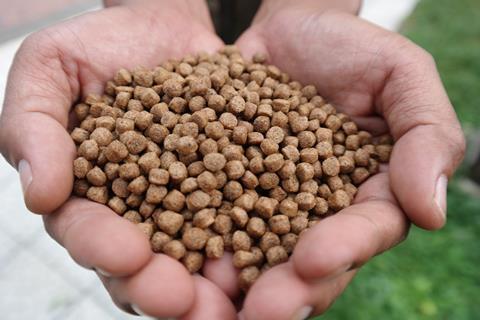Researchers have discovered a blend of organisms that not only act as a probiotic in animal feed, but can also inhibit the toxic effects of a mycotoxin in the MCF-7 breast cancer cell line.

The research by a team at Purdue University offers potential for probiotics in animal feed to deliver a double whammy of benefits by strengthening the gastrointestinal tract and also detoxifying mycotoxins in agricultural settings.
The study is reported in ‘Sequestration of zearalenone using microorganisms blend in vitro’, which appears in the journal Letters in Applied Microbiology, an Applied Microbiology International publication.
Their team-up with Biomatrix International resulted in the discovery of a blend of probiotic organisms that can inhibit the estrogenic activity of the mycotoxin Zearalenone in the MCF-7 breast cancer cell line.
Mycotoxin contamination
Corresponding author Professor Arun K Bhunia explains: “Mycotoxins are fungal metabolites that are produced in varieties of crops and grains such as corn. With corn being a main component of animal feed, there is a high incidence of mycotoxin contamination, specifically zearalenone.
“Animals ingesting the mycotoxin-contaminated corn can suffer from reproductive disorders resulting in economic losses due to the loss of animal performance, breeding failure, and increased costs of treatments. Thus, there is a need to find novel prophylactics which can help mitigate mycotoxin problems in feed.
“Recently, probiotics have garnered attention as a nutraceutical in animal feed due to their merit in strengthening the gastrointestinal tract, along with their ability to detoxify mycotoxins. Thus, in the present study, a probiotic blend was utilized to ascertain its ability to detoxify zearalenone and estrogen-associated effects.”
The first step was to incubate the probiotic blend with zearalenone in a time-dependent manner to determine if there was any reduction in free zearalenone levels.
Phase two
Once the team determined there was an effect, they moved onto the next phase of the research to see if there were any physiologically relevant consequences, especially limiting estrogenic activity.
“To do so, the MCF-7 breast cancer cell line rich in estrogen receptors was grown. These cells proliferate rapidly in the presence of zearalenone mycotoxin which is structurally similar to estrogen,” Professor Bhunia says.
“Probiotic treatments were applied, and cytotoxicity was measured to ensure there was no inherent damage to the cells.
“Next, the treatments were again added to the MCF-7 cells and the estrogen-induced proliferation was measured. Here, we determined that MCF-7 cells challenged with zearalenone and treated with probiotics did not differ significantly from untreated cells suggesting the blend can reduce the estrogen-like effects of the toxin.”
Swine model
The next stage will be to carry out the same study in vivo using a swine model to determine if the results can be reproduced, Professor Bhunia says.
“Based on the research, the team believes that probiotics will gain even more recognition as a novel method of managing the mycotoxin problems that can cause huge health problems not only for animals but also for humans,” he says.
“There has been a rapid shift away from utilizing antimicrobial agents in feed and thus enriching with probiotics that can not only treat the problem but provide alternative benefits that can pave the way for further research in the area to discover/optimize novel probiotic strains.”
The study was led by graduate student, Vignesh Nathan and postdoc, Dr. Rishi Drolia (now Asssitant Prof at Eastern Kentucky University) with supervision by Prof. Arun Bhunia at Purdue University and support from colleagues at Biomatrix International.
‘Sequestration of zearalenone using microorganisms blend in vitro’ appears in Letters in Applied Microbiology.
Topics
- Agriculture
- animal feed
- Applied Microbiology International
- Arun K Bhunia
- Asia & Oceania
- Biomatrix International
- Community
- Early Career Research
- Fungal Therapeutics
- Fungi
- Healthy Land
- Letters in Applied MIcrobiology
- MCF-7 breast cancer cell
- Mycology
- mycotoxins
- One Health
- Probiotics, Prebiotics & Synbiotics
- Research News
- Rishi Drolia
- Vignesh Nathan
- zearalenone







No comments yet